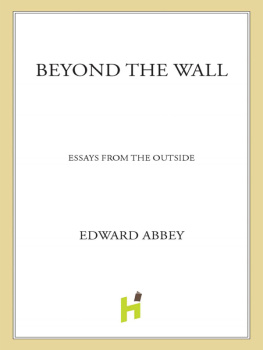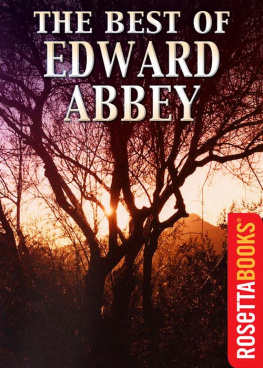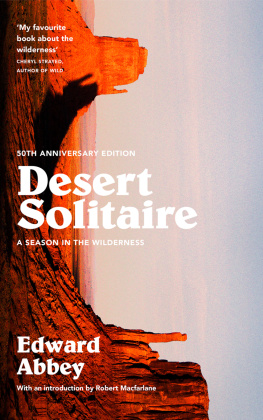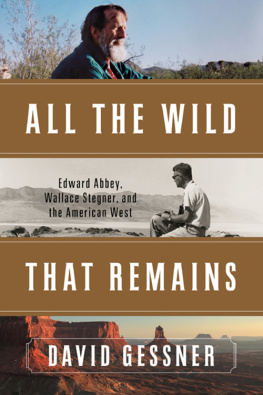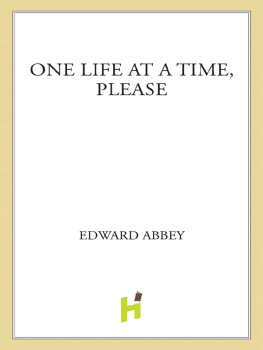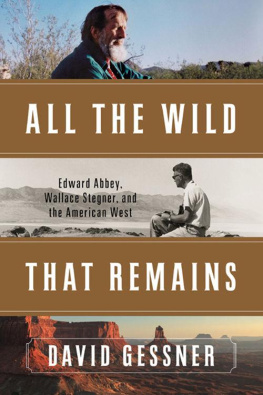Edward Abbey - Beyond the Wall: Essays from the Outside
Here you can read online Edward Abbey - Beyond the Wall: Essays from the Outside full text of the book (entire story) in english for free. Download pdf and epub, get meaning, cover and reviews about this ebook. year: 1984, publisher: Henry Holt and Co., genre: Romance novel. Description of the work, (preface) as well as reviews are available. Best literature library LitArk.com created for fans of good reading and offers a wide selection of genres:
Romance novel
Science fiction
Adventure
Detective
Science
History
Home and family
Prose
Art
Politics
Computer
Non-fiction
Religion
Business
Children
Humor
Choose a favorite category and find really read worthwhile books. Enjoy immersion in the world of imagination, feel the emotions of the characters or learn something new for yourself, make an fascinating discovery.
- Book:Beyond the Wall: Essays from the Outside
- Author:
- Publisher:Henry Holt and Co.
- Genre:
- Year:1984
- Rating:5 / 5
- Favourites:Add to favourites
- Your mark:
- 100
- 1
- 2
- 3
- 4
- 5
Beyond the Wall: Essays from the Outside: summary, description and annotation
We offer to read an annotation, description, summary or preface (depends on what the author of the book "Beyond the Wall: Essays from the Outside" wrote himself). If you haven't found the necessary information about the book — write in the comments, we will try to find it.
In this wise and lyrical book about landscapes of the desert and the mind, Edward Abbey guides us beyond the wall of the city and asphalt belting of superhighways to special pockets of wilderness that stretch from the interior of Alaska to the dry lands of Mexico.
Beyond the Wall: Essays from the Outside — read online for free the complete book (whole text) full work
Below is the text of the book, divided by pages. System saving the place of the last page read, allows you to conveniently read the book "Beyond the Wall: Essays from the Outside" online for free, without having to search again every time where you left off. Put a bookmark, and you can go to the page where you finished reading at any time.
Font size:
Interval:
Bookmark:



FOR CLARKE
AND ALL THE OTHER CARTWRIGHTS
Part of the essay called A Walk in the Desert Hills was presented as the fourth annual Belkin Lecture at the University of California, San Diego, in April 1982. An abridged version of this same essay was published in GEO in 1983. I wish to thank the trustees of UCSD and the publishers of GEO for permission to reprint the entire essay here.
A portion of the essay Gather at the River first appeared in Outside in the fall of 1983; again I thank the publisher for permission to reprint.
The remaining essays in this book were first published during the 1970s as parts of the text of large-format scenic photography books. (See copyright page for details.) Most of these books were expensive (one retailed for a flat $100); my enemies could buy them but few of my friends. All but The Hidden Canyon and Cactus Country are now out of print and unavailable. This seemed to me to be adequate justification for recollecting and revising what I feel are the best of the chapters from those books.
Furthermore it is my belief, based on my experience and that of others, that almost nobody bothers to read the words in picture books. Although it may be true, as Confucius said, that one word is worth a thousand pictures (if its the right word), it is also true that ordinary prose cannot easily share pages with the brilliant work of such camera artists as John Blaustein, Ernst Haas, Philip Hyde and David Muench. Yet my words were written to be seen, ingested, mentally processed. Like any writer Id rather be read than dead; like all serious authors Id rather be dead than not read. Therefore I take the liberty of offering these selected essays to the public in a sort of liberated form, free from the domineering, overwhelming presence of true-life, real-color, full-page, scenic-landscape photographs.
The reader will notice that most of these essays deal in one way or another with aspects of the desert. Even the final chapter, an account of a river journey down the North Slope of Alaska, is largely about a region which, because of its low annual precipitation, has been classified by geographers as Arctic desert. The emphasis on Americas arid parts is not an accident.
The problem began sixteen years ago when I published a book of personal narrative called Desert Solitaire . That book was written in 196667 during a year of wandering from Las Vegas to Hoboken to the Everglades to Death Valley. The final chapters were composed in the corner of a bar serving a legal house of prostitution at Ash Meadows, Nevada, where I waited each day with my little yellow schoolbus (I was the driver) to pick up the children from Shoshone High School for transfer to the village of Furnace Creek in Death Valley. While waiting, I scribbled. A sweet young sexual therapist named Aliciawhore seems much too harsh a termhelped me with the big words and other technical matters which the IRS accepted as tax-deductible research. We mailed the thing to New York (book rate), and in January 1968, on a dark night in a back alley in the dead of winter, Solitaire was released from its cage and turned loose upon an unsuspecting public.
Nothing happened.
The publisher let the first edition go out of print, and within a year my little book had died a natural death. Not surprised, I found myself a job as a fire lookout on North Rim, Grand Canyon, and continued working for a living.
Three years later, however, Desert Solitaire was exhumed and resurrected in paperback, in which form it has enjoyed a modest but persistent life, burrowing along from year to year about two feet underground like a blind and seditious mole. I havent had to turn my hand to an honest days work since 1972.
How to explain such queer phenomena? Who knows? I dont much like the book myself; in the authors opinion Good News, Abbeys Road and Down the River are better bookslivelier, funnier, more deeply felt, more richly ambiguous, more craftily designed. But as to that, who cares but the author himself? Let the poor scrivening wretch sink ever deeper into his delusions. If youd care for some really good interpretations of the American desert experience I recommend the writings of Colin Fletcher, Ann Zwinger, Barry Lopez, Rob Schulteiss, Ruth Kirk, Edmund Jaeger and Peggy Larson, and the now-classic works of Powell, Dutton, Van Dyke, Austin and Krutch.
No one, so far as I know, has yet attempted to work the American desert into fiction, that is, to make the desert itselfthe landscape, the light, the air, the deserts primordial inhabitantsan essential character in a novel. Probably it cannot be done. As for myself, diverted sixteen years ago into desert digressions, I have no intention of writing anything more on so barren and desiccated a subject. This book is my last to be writ in sand. Never again will I vandalize the slipface of a dune with my impertinent signature. I have nothing new to say about vultures, stone, scorpions, kissing bugs, alkali, silence, death or the sphinxlike Medusa rock that waits for the unwary at the head, the dead end, the ultimate cul-de-sac, of Skeleton Gulch. Let other younger, more hopeful voices carry on.
In any case it is not necessary to read a book to enjoy our strange Western deserts. In fact it is better, I think, to enter the desert the first time with a clean, clear mind devoid of preconceptions, so far as possible. Afterward you may wish to compare your adventures and your response with others, as recorded in books.
Fortunately the American desert remains open to all, most of it still our public domain. No passports needed, no examinations to undergo, no special equipment required, no experience necessary. A journey into the wilderness is the freest, cheapest, most nonprivileged of pleasures. Anyone with two legs and the price of a pair of war surplus combat boots ($17.95) may enter. You will never see a Public PropertyKeep Out sign in the back of beyond.
First you might prefer to get a broad overview from an airplane or distant passing views from an automobile or a commercial raft trip down a public river. But to get past the superficial, two-dimensional, merely aesthetic experience you must, eventually, leave the mechanical conveyances behind and venture into the rock, cactus and forbidden hills on foot. (A horse will do but is considerable trouble; horses are such delicate, sensitive, spooky creatures.) If you desire to know, feel and live the desert, as opposed to only looking at it as tourists and art critics do, youve got to arise from your bottom end and walk upright like a human being, alone or with a friend, into the ancient blood-thrilling primeval freedom of those vast and democratic vistas. You will never understand the secret essence of the word freedom until you do.
This question of muscle and will versus motors and money is still a sore issue with some. Like other natural conservatives I have been accused of elitism by those who think that their upper-bracket incomes give them the special right to drive their Jeeps, Blazers, Broncos and Winnebagos anywhere and everywhere. The opposite is the truth: any poor slob with enough cash in his jeans to buy a ghetto blaster can buy instead a backpack, a sleeping bag and a bus ticket to Yellowstone. But only the affluentthe financial elitecan afford the heavy expense of ATCs, ATVs, RVs and ORVs. Machines are domineering, exclusive, destructive and costly; it is they and their operators who would deny the enjoyment of the back country to the rest of us. About 98 per cent of the land surface of the contiguous USA already belongs to heavy metal and heavy equipment. Let us save the 2 per centthat saving remnant. Or better yet, expand, recover and reclaim much more of the original American wilderness. About 50 per cent would be a fair and reasonable compromise. We have yielded too much too easily. It is time to start shoving cement and iron in the opposite direction before the entire nation, before the whole planet, become one steaming, stinking, overcrowded high-tech ghetto. Open space was the fundamental heritage of America; the freedom of the wilderness may well be the central purpose of our national adventure.
Font size:
Interval:
Bookmark:
Similar books «Beyond the Wall: Essays from the Outside»
Look at similar books to Beyond the Wall: Essays from the Outside. We have selected literature similar in name and meaning in the hope of providing readers with more options to find new, interesting, not yet read works.
Discussion, reviews of the book Beyond the Wall: Essays from the Outside and just readers' own opinions. Leave your comments, write what you think about the work, its meaning or the main characters. Specify what exactly you liked and what you didn't like, and why you think so.

